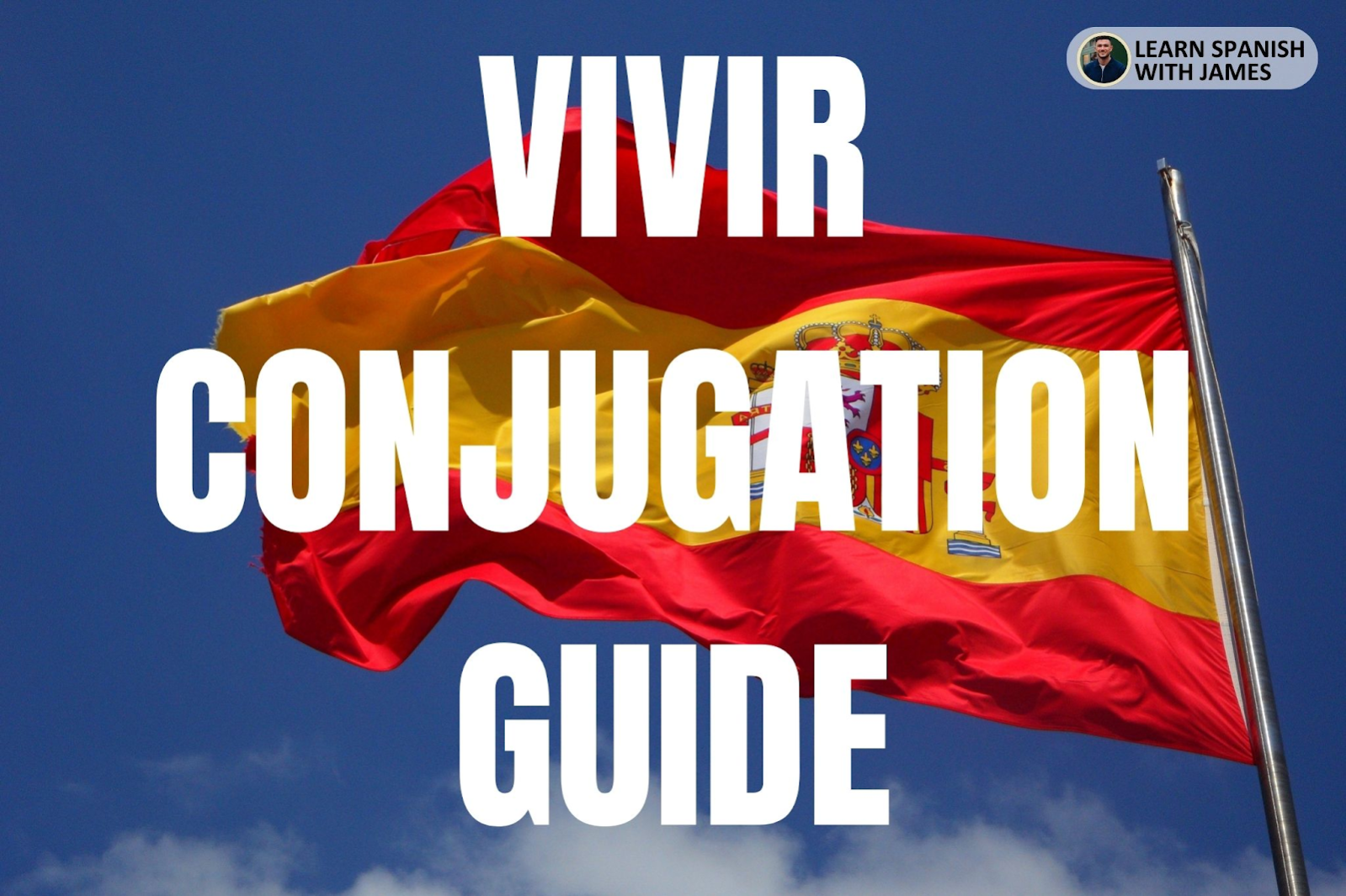Vivir Conjugation Chart & Full Tense Guide

“Vivir” means “to live” and it is a commonly used -IR verb in Spanish that follows the regular set of conjugations for -IR verbs.
I’m James, from Learn Spanish With James, and in this guide, you’ll find a detailed verb chart with various “vivir” conjugations and verb forms.
From the present tense to the past, subjunctive to conditional, I’ll show you how to conjugate “vivir” in every Spanish tense.
You’ll also find English translations and example sentences, which should help you to use this Spanish verb authentically, just as native speakers do.
Present Tense
Pronouns Pronombres
I yo vivo
you tú vives
he,she,it, you(formal) él,ella,usted vive
we nosotros,nosotras vivimos
you pl. vosotros, vosotras vivís
they, you pl. (formal) ellos,ellas,ustedes viven
When We Use the Present Tense
The present tense in Spanish is used to describe actions that are happening right now, habitual actions, and general truths.
For the Spanish verb “vivir”, the present tense describes where or (in some contexts) how someone lives.
As with any regular verb (like “hablar“, “comer”, or “vivir”), its forms are made by taking the verb stem and adding the appropriate endings for each subject pronoun.
I have provided examples of this below.
Examples of Vivir in the Present Tense
- Yo vivo en una ubicación privilegiada. (I live in a privileged location.)
- Tú vives cerca del mar. (You live near the sea.)
- Él/Ella vive en la ciudad grande. (He/She lives in the big city.)
- Nosotros vivimos en una casa nueva. (We live in a new house.)
- Vosotros vivís en un apartamento antiguo. (You all live in an old apartment.)
- Ellos/Ellas viven en el campo. (They live in the countryside.)
Preterite Tense
Pronouns Pronombres
I yo viví
you tú viviste
he, she. it, you (formal) él, ella, usted vivió
we nosotros, nosotras vivimos
you (plural) vosotros, vosotras vivisteis
they, you (pl. formal) ellos, ellas, ustedes vivieron
When We Use the Preterite Tense
The preterite tense conjugation in Spanish is used to describe past actions that are completed.
The translation in the first person form is “I lived”.
Do not confuse the preterite tense with the imperfect tense, which we’ll come onto shortly.
Here are the forms of this regular verb in the preterite past tense.
Examples of Vivir in the Preterite Tense Conjugation
- Yo viví en España el año pasado. (I lived in Spain last year.)
- Tú viviste en Nueva York por cinco años. (You lived in New York for five years.)
- Él/Ella vivió en esta ciudad por mucho tiempo. (He/She lived in this city for a long time.)
- Nosotros vivimos en el extranjero por un tiempo. (We lived abroad for a while.)
- Vosotros vivisteis una experiencia única. (You all lived a unique experience.)
- Ellos/Ellas vivieron momentos inolvidables. (They lived unforgettable moments.)
Imperfect Tense
Pronouns Pronombres
I yo vivía
you tú vivías
he, she, it, you (formal) él, ella, usted vivía
we nosotros, nosotras vivíamos
you (plural) vosotros, vosotras vivíais
they, you(pl. formal) ellos, ellas, ustedes vivían
When We Use the Imperfect Tense
The imperfect tense in Spanish is used to describe past actions that were ongoing or habitual in the past.
It is also used for background information and descriptions in the past.
The translation is “was living” or “used to live”. Here are the forms of this regular verb in the imperfect tense.
Examples of the Imperfect Tense Vivir Conjugation
- Yo vivía en un mundo de maldad. (I used to live in a world of evil.)
- Tú vivías en esta ciudad cuando era joven. (You used to live in this city when you were young.)
- Él/Ella vivía una vida tranquila en el campo. (He/She used to live a peaceful life in the country.)
- Nosotros vivíamos en una casa pequeña. (We used to live in a small house.)
- Vosotros vivíais en un barrio animado. (You all used to live in a lively neighborhood.)
- Ellos/Ellas vivían en una época diferente. (They used to live in a different era.)
Future Tense
Pronouns Pronombres
I yo viviré
you tú vivirás
he,she,it, you(formal) él,ella,usted vivirá
we nosotros,nosotras viviremos
you pl. vosotros, vosotras viviréis
they, you pl. (formal) ellos,ellas,ustedes vivirán
When We Use the Future Tense
The future tense in Spanish is used to describe actions that will happen in the future. The key word here, and literal translation, is “will”.
With the Spanish verb ”vivir”, you would use this tense to describe the plans you or somebody else has for living somewhere new or in a different manner.
Making sense? Here are the forms of this regular -IR verb in the future tense.
Examples of Vivir in the Future Tense
- Yo viviré en otro país el próximo año. (I will live in another country next year.)
- Tú vivirás una experiencia inolvidable. Ya verás (You will live an unforgettable experience. You’ll see)
- Él/Ella vivirá en una ciudad diferente. (He/She will live in a different city.)
- Nosotros viviremos en una casa más grande. (We will live in a bigger house.)
- Vosotros viviréis en el extranjero por un tiempo. (You all will live abroad for a while.)
- Ellos/Ellas vivirán momentos de felicidad. (They will live moments of happiness.)
Conditional Tense
Pronouns Pronombres
I yo viviría
you tú vivirías
he,she,it, you(formal) él,ella,usted viviría
we nosotros,nosotras viviríamos
you pl. vosotros, vosotras viviríais
they, you pl. (formal) ellos,ellas,ustedes vivirían
When We Use the Conditional Tense
The conditional tense in Spanish is used to express actions that would happen under certain conditions or to convey politeness.
Remember, the conditional tense is “would” and the future tense is “will”.
Each Spanish verb conjugation for ”vivir” in the conditional tense conveys the notion of someone changing their living situations under certain conditions.
“Vivir” in the conditional tense is really easy to remember.
In order to form the correct Spanish verb conjugation, just add the relevant endings to the infinitive form of the verb.
Examples of Vivir in the Conditional Tense
- Yo viviría en la playa si pudiera. (I would live on the beach if I could.)
- Tú vivirías en un castillo si fueras millonario. (You would live in a castle if you were a millionaire.)
- Él/Ella viviría una vida diferente si pudiera elegir. (He/She would live a different life if he/she could choose.)
- Nosotros viviríamos en otro país si tuviéramos la oportunidad. (We would live in another country if we had the opportunity.)
- Vosotros viviríais más tranquilos si no hubiera tanto ruido. (You all would live more peacefully if there weren’t so much noise.)
- Ellos/Ellas vivirían más tiempo si cuidaran su salud. (They would live longer if they took care of their health.)
Perfect Tense
Pronouns Pronombres Auxiliary verb ‘haber’
I yo he vivido
you tú has vivido
he,she,it, you(formal) él,ella,usted ha vivido
we nosotros,nosotras hemos vivido
you pl. vosotros, vosotras habéis vivido
they, you pl. (formal) ellos,ellas,ustedes han vivido
When We Use the Perfect Tense
The perfect tense, known in Spanish as the “pretérito perfecto” tense, describes actions that have happened recently or actions that affect the present.
The literal translation is “has/have lived”.
We conjugate ”vivir” in this tense by using the auxiliary verb “haber” in the present tense followed by the past participle ”vivido.”
This may sound complicated, but it’s very easy. Just look at the example sentences to see this in context.
Examples of Vivir in the Perfect Tense
- Yo he vivido muchas experiencias en mi vida. (I have lived many experiences in my life.)
- Tú has vivido en diferentes lugares del mundo. (You have lived in different places around the world.)
- Él/Ella ha vivido situaciones difíciles. (He/She has lived through difficult situations.)
- Nosotros hemos vivido momentos de alegría y tristeza. (We have lived moments of joy and sadness.)
- Vosotros habéis vivido en esta ciudad desde hace años. (You all have lived in this city for years.)
- Ellos/Ellas han vivido aventuras increíbles. (They have lived incredible adventures.)
Pluperfect Tense
Pronouns Pronombres Auxiliary verb ‘haber’
I yo había vivido
you tú habías vivido
he,she,it, you(formal) él,ella,usted había vivido
we nosotros,nosotras habíamos vivido
you pl. vosotros, vosotras habíais vivido
they, you pl. (formal) ellos,ellas,ustedes habían vivido
When We Use the Pluperfect Tense
The pluperfect tense in Spanish is used to describe actions that had already happened before another past action or a specific point in the past.
So, the perfect tense is “have lived” and the pluperfect tense is “had lived”. Do you notice the difference?
Again, we form the pluperfect tense by using the imperfect tense of the auxiliary verb “haber” followed by the past participle of the verb.
Examples of Vivir in the Pluperfect Tense
- Yo había vivido muchas experiencias antes de cumplir treinta años. (I had lived many experiences before turning thirty.)
- Tú habías vivido en esa casa antes de mudarte. (You had lived in that house before moving out.)
- Él/Ella había vivido en ese país antes de venir aquí. (He/She had lived in that country before coming here.)
- Nosotros habíamos vivido momentos de incertidumbre antes de encontrar trabajo. (We had lived moments of uncertainty before finding a job.)
- Vosotros habíais vivido en este barrio antes de la remodelación. (You all had lived in this neighborhood before the renovation.)
- Ellos/Ellas habían vivido muchas aventuras antes de establecerse. (They had lived many adventures before settling down.)
Future Perfect Tense
Pronouns Pronombres Auxiliary verb ‘haber’
I yo habré vivido
you tú habrás vivido
he,she,it, you(formal) él,ella,usted habrá vivido
we nosotros,nosotras habremos vivido
you pl. vosotros, vosotras habréis vivido
they, you pl. (formal) ellos,ellas,ustedes habrán vivido
When We Use the Future Perfect Tense
The future perfect tense in Spanish is used to describe actions that will have been completed by a certain point in the future.
So, the translation is “will have lived”.
Just like the previous two examples, we form the future tense by conjugating the auxiliary verb “haber” and using the past participle of the verb.
Examples of Vivir in the Future Perfect Tense
- Yo habré vivido en la ciudad por diez años el próximo verano. (I will have lived in this city for ten years by next summer.)
- Tú habrás vivido muchas experiencias cuando llegues a mi edad. (You will have lived many experiences when you reach my age.)
- Él/Ella habrá vivido en diferentes países antes de establecerse. (He/She will have lived in different countries before settling down.)
- Nosotros habremos vivido en este barrio desde hace mucho tiempo cuando nos mudemos. (We will have lived in this neighborhood for a long time when we move out.)
- Vosotros habréis vivido en esta casa hasta que encuentren una mejor. (You all will have lived in this house until you find a better one.)
- Ellos/Ellas habrán vivido momentos inolvidables cuando regresen. (They will have lived unforgettable moments when they come back.)
Conditional Perfect Tense
Pronouns Pronombres Auxiliary verb ‘haber’
I yo habría vivido
you tú habrías vivido
he,she,it, you(formal) él,ella,usted habría vivido
we nosotros,nosotras habríamos vivido
you pl. vosotros, vosotras habríais vivido
they, you pl. (formal) ellos,ellas,ustedes habrían vivido
When We Use the Conditional Perfect Tense
The conditional perfect tense in Spanish is used to describe actions that would have been completed under certain conditions in the past.
As you should now know, we form each conjugation in this tense by using the conditional tense of the auxiliary verb “haber” followed by the past participle of the verb.
Examples of Vivir in the Conditional Perfect Tense
- Yo habría vivido en esa ciudad si hubiera encontrado trabajo. (I would have lived in that city if I had found a job.)
- Tú habrías vivido una vida diferente si hubieras tomado otras decisiones. (You would have lived a different life if you had made other decisions.)
- Él/Ella habría vivido más tiempo si hubiera cuidado su salud. (He/She would have lived longer if he/she had taken care of his/her health.)
- Nosotros habríamos vivido en el campo si hubiéramos heredado una finca. (We would have lived in the countryside if we had inherited a farm.)
- Vosotros habríais vivido en este barrio si hubiera habido más seguridad. (You all would have lived in this neighborhood if there had been more security.)
- Ellos/Ellas habrían vivido momentos felices si hubieran estado juntos. (They would have lived happy moments if they had been together.)
Present Subjunctive
Pronouns Pronombres
I yo viva
you tú vivas
he,she,it, you(formal) él,ella,usted viva
we nosotros,nosotras vivamos
you pl. vosotros, vosotras viváis
they, you pl. (formal) ellos,ellas,ustedes vivan
When We Use the Present Subjunctive
Even if you have not yet learned how to use the present subjunctive in Spanish, you should know that we use it to express desires, doubts, wishes, recommendations, or possibilities.
In order to form the present subjunctive form of “vivir”, we take the verb stem and replace each one with present tense -AR verb endings.
Making sense? Look at the conjugation chart, and the example sentences below.
Examples of Vivir in the Present Subjunctive
- Es importante que yo viva cada día al máximo. (It is important that I live each day to the fullest.)
- Quiero que tú vivas tus sueños. (I want you to live your dreams.)
- Espero que él/ella viva una vida plena. (I hope he/she lives a full life.)
- Es necesario que nosotros vivamos en armonía con la naturaleza. (It is necessary that we live in harmony with nature.)
- Prefiero que vosotros viváis en un ambiente tranquilo. (I prefer that you all live in a peaceful environment.)
- Dudo que ellos/ellas vivan en esa casa por mucho tiempo. (I doubt they will live in that house for long.)
Imperfect Subjunctive
Pronouns Pronombres
I yo viviera, viviese
you tú vivieras, vivieses
he,she,it, you(formal) él,ella,usted viviera, viviese
we nosotros,nosotras viviéramos, viviésemos
you pl. vosotros, vosotras vivierais, vivieseis
they, you pl. (formal) ellos,ellas,ustedes vivieran, viviesen
When We Use the Imperfect Subjunctive
The imperfect subjunctive in Spanish is used to express desires, doubts, wishes, recommendations, or possibilities in the past.
We form it by taking the verb stem and adding the appropriate endings for each subject pronoun.
Use cases for the imperfect subjunctive can be complex, but some examples are below.
Examples of Vivir in the Imperfect Subjunctive
- Yo viviera en otro país si pudiera. (I would live in another country if I could.)
- Tú vivieras una vida diferente si tomaras otras decisiones. (You would live a different life if you made other decisions.)
- Él/Ella viviera más tiempo si cuidara su salud. (He/She would live longer if he/she took care of his/her health.)
- Nosotros viviéramos en el campo si heredáramos una finca. (We would live in the countryside if we inherited a farm.)
- Vosotros vivierais en esta casa hasta que encontrarais una mejor. (You all would live in this house until you found a better one.)
- Ellos/Ellas vivieran momentos felices si estuvieran juntos. (They would live happy moments if they were together.)
Affirmative Imperative
Pronouns Pronombres
you tú ¡vive!
he,she,it, you(formal) él,ella,usted ¡viva!
we nosotros,nosotras ¡vivamos!
you pl. vosotros, vosotras ¡vivid!
they, you pl. (formal) ellos,ellas,ustedes ¡vivan!
When We Use The Affirmative Imperative
The affirmative imperative in Spanish is used to give direct commands or orders in a positive manner.
When we use the affirmative imperative form of “vivir”, we are instructing or encouraging someone to live in a certain way.
Examples of the Spanish Verb “Vivir” in the Affirmative Imperative
- ¡Vive cada día como si fuera el último! (Live each day as if it were your last!)
- Vivid la vida con pasión y alegría. (Live life with passion and joy.)
- Vivamos el presente sin preocuparnos por el futuro. (Let’s live in the present without worrying about the future.)
- Vivid en paz y fraternidad con vuestros vecinos. (Live in peace and brotherhood with your neighbors.)
- ¡Vivan cada momento como si fuera un regalo! (Live each moment as if it were a gift!)
Negative Imperative
Pronouns Pronombres
you tú ¡no vivas!
he,she,it, you(formal) él,ella,usted ¡no viva!
we nosotros,nosotras ¡no vivamos!
you pl. vosotros, vosotras ¡no viváis!
they, you pl. (formal) ellos,ellas,ustedes ¡no vivan!
When We Use The Negative Imperative
The negative imperative in Spanish is used to give commands or orders in a negative manner, instructing someone not to carry out an action.
The negative imperative Spanish verb conjugation uses the word “no” before the base form of the verb without any subject pronouns.
When employing the negative imperative with the verb “vivir”, we prohibit or advise against living somewhere or in a certain way.
Examples of the Spanish Verb “Vivir” in the Negative Imperative
- ¡No vivas en el pasado, mira hacia adelante! (Don’t live in the past, look forward!)
- No viváis por encima de vuestros medios. (Don’t live beyond your means.)
- No vivamos en la ignorancia, busquemos conocimiento. (Let’s not live in ignorance, let’s seek knowledge.)
- No viváis en soledad, buscad compañía. (Don’t live in loneliness, seek companionship.)
- ¡No vivan con miedo, enfrenten sus temores! (Don’t live in fear, face your fears!)
Online Spanish Courses & Grammar Courses
For a full list of Beginner, Intermediate and Advanced Courses, check out this full list of online Spanish courses.
I put this list together myself, and it comprises a mixture of courses that offer Spanish grammar practice for all levels, including Spanish verbs and tenses, conversational practice, listening and writing exercises in Spanish, free Spanish courses, and a whole lot more.
The fastest way to learn Spanish is to test a mixture of Spanish resources and choose the course that coincides most with your learning style.
In addition to online Spanish courses, on this site you will find a wide range of Spanish podcasts, Spanish apps, Spanish YouTube channels, and both online and physical Spanish language schools.

About James – Or Should that be Santiago?
My name is James. I am a Brit with a love for the Spanish language. I have lived in Spain, Argentina, and Costa Rica, and I have been teaching Spanish for over a decade. This site will show you how to master the elements of Spanish grammar that often dishearten learners. I hope you enjoy the site and find it useful.
If you are interested in taking your Spanish to the next level, check out the Courses section for a full list of the Spanish courses I suggest. All reviews are based on my personal opinions.







